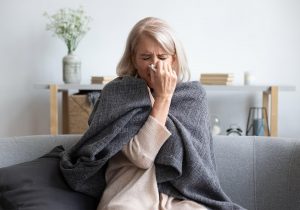
What is RSV?
Have you been sniffling, sneezing, coughing, and wheezing, and think you have a common cold? You may need to think again because there’s another virus among us that only causes sniffles for some, but for others, it can lead to a serious sickness. It’s known as RSV, which stands for respiratory syncytial virus. It’s as common as the common cold, and it shares similar symptoms and even falls during the same cold and flu season. But while a cold is a minor inconvenience, RSV can turn into a major health problem for certain ages and groups of people. So, discover how these three little letters can pose such a big threat, along with the common symptoms of this common seasonal virus. Then, learn how to treat and prevent RSV, along with which people are most at risk for much more than a runny nose.
Common sense about RSV
RSV is a common respiratory virus that causes infections of the respiratory tract and lungs. The virus can spread from person to person in several ways, including through the air by sneezing or coughing, through direct contact with someone infected, and by touching a contaminated object and then touching your nose, eyes, or mouth. Not only is the virus easily spread, but it’s so widespread that most people have been infected many times before, with most children having the virus for the first time by age two. Since you can’t develop immunity to RSV, it’s common to have the virus over and over throughout your life. You may not have known you had RSV since it usually only causes mild symptoms that feel like the common cold but go away on their own in a week or two. However, this is not always the case with every case of RSV.
The age of RSV
Now that RSV is in the air, it should be on your mind. See, the virus can cause a serious lung infection and health complications like pneumonia that require a hospital stay for certain ages and people most at risk, including infants up to one year old, premature babies, adults ages 60 and older, adults with chronic heart or lung disease, and anyone—at any age—with a weakened immune system.
Symptoms of sickness
If you find yourself feeling under the weather, it can be hard to tell whether you have RSV or the common cold because the symptoms are so similar. One way to tell the difference is that RSV symptoms tend to appear four to six days after getting infected, while signs of a cold catch up with you in a matter of two or three. And RSV symptoms usually show up in stages, rather than all at once. With a case of RSV, the most common “cold-like” symptoms that appear in adults and children include:
- Runny nose
- Nasal congestion
- Sneezing
- Wheezing
- Coughing
- Lack of appetite
- Fatigue
- Mild headache
- Sore throat
- Fever
Yet for infants, the only signs of RSV tend to be trouble breathing, fussiness, and decreased activity. If you’re having any of these symptoms but aren’t sure if it’s RSV, the only way to tell is to get tested by your SignatureMD-affiliated doctor.
The Rx for RSV
For healthy adults and children, most RSV infections are mild and quickly subside on their own in a week or two. During this time, there are several ways to manage your symptoms and suffering. You can take over-the-counter pain relievers and fever reducers, but consult with your SignatureMD-affiliated doctor before taking any medications or giving them to your child. You should also drink plenty of fluids to avoid getting dehydrated and try to get enough rest. If you experience severe symptoms and you’re having trouble breathing, you may need to be hospitalized to recover.
The best defense is better habits
If you’re worried sick about getting sick from RSV, consider these healthy habits as part of your daily routine:
- Take advantage of RSV vaccines for adults over age 60, pregnant women, infants, and certain young children.
- Wash your hands frequently with soap and water.
- Avoid touching your face, eyes, nose, or mouth with unwashed hands.
- Cover your sneezes and coughs with a tissue rather than your hands.
- Limit close contact, such as shaking hands and kissing, with anyone who is sick or getting sick.
- Avoid sharing cups, utensils, or toys that may have been contaminated with RSV.
- Disinfect and clean any surfaces or objects you often touch.
- Stay home when you’re sick.
RSV is nothing to sneeze at, so spread the word about this easily spread virus and the many ways to prevent it.